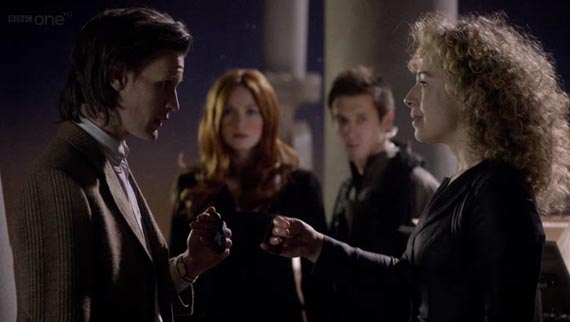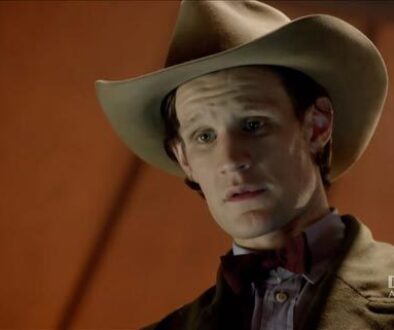The Wedding of River Song Review

Clint Hassell reviews The Wedding of River Song, the 13th episode of Doctor Who Series 6.
Steven Moffat is a liar.
In an interview with Total TV magazine
But first, some comments:
This finale was such an info dump! I liked the episode and was interested (though inundated) while watching. However, when I re-watched the finale in order to write this review, I noticed that I hardly wrote any commentary about what the narrative was causing me to feel. Instead, I was merely taking notes to keep up with the many plot points. I wonder if this finale would have worked better spread over two episodes, perhaps (hopefully) by reducing the Ganger adventure to a single episode.

I loved the Dalek cameo. It was a quick scene, but it felt just right. And the Doctor not only defeated it, but he cut the eyestalk off! I haven’t loved a defeat of a Dalek this much since Ace took one out with a baseball bat in “Remembrance of the Daleks.”
The Dalek leads us to the Teselecta, who guides us to Gantok (who meets his end in probably the most-poorly edited twenty seconds in the entirety of the revived Doctor Who), who takes us to Dorium. We knew that Dorium would return for the finale, but this is certainly NOT how I expected that to happen!
The Doctor tells Dorium that, with the TARDIS, he could elude his death for as long as he wished, and he names six things he could do instead: invent a new car, save the dodo, join the Beatles, elope with “Liz the First,” help Rose Tyler with her homework, and attend all of Jack’s stag parties in one night. What does the Doctor’s list say about him? The first three activities are fun and would bring him notoriety, but wouldn’t necessarily make the universe a better place; the latter three include spending time with loved ones. While both motivations definitely fit the Doctor, I’m surprised that he didn’t also include activities that really would have benefited mankind like “curing cancer” or “saving the galaxy from the threat of the Cybermen by ensuring that Mondasians never conquer the Cryons of Telos.”

How heartbreaking is the moment when the Doctor realizes that the Brig is dead? I’m impressed that they remembered Lethbridge-Stewart, and more, that his death became a pivotal catalyst in the episode.
I’m annoyed by the “can’t cross your own timestream” nonsense, an inconsistent “rule” which seems to come and go from story to story. One of the absolute brilliant things about Doctor Who is that all of the Doctors can – and have – interacted.
Favorite lines:
“Ooh, that flirting! Do I have to watch this?” Kovarian looked truly miserable, and not just because she was tied to a chair.

Amy: “So, you and me, we should get a drink sometime.”
Rory: (not wishing to disagree with the woman who just murdered Kovarian) “OK.”
Amy: “And married.”
Rory: “Fine.”
The Silent taunting a dying Rory was a fun, meta moment, though I question how the Silents knew of Rory’s repeated deaths since they’ve all occurred in a dream, been retconned out of existence, were staged, happened in the past/in another dimension, or were hallucinations caused by the TARDIS.
I love Amelia/Amy’s tinkly garden chimes and the magical leitmotif that plays every time we visit.
I am so pleased that, now, instead of River and the Doctor forming a relationship as they meet at varying points in their timestreams, it’s River and Amy. It’s an awesome parallel and a hopeful, fitting end to their storylines. Also, it was nice to see the return of the River we love. The River in “Let’s Kill Hitler” seemed out-of-character.
Amy can no longer travel with the Doctor as his companion. She doomed Kovarian to her death and that, combined with Rory saying that he doesn’t want to travel with the Doctor in “The Girl Who Waited,” means that, while I may dearly love Amy and Rory as characters, I do not wish to see them return to the series as anything more than River’s parents.
Two totally not-serious questions:
I get the hat fetish, but what’s the fascination with the Doctor’s beard? Oh, and I really dislike the Doctor’s longer hair. Mullets are not cool.
Also, the TARDIS has a Superphone, but no WiFi?
Serious questions I still have:

If, during the assassination of the Doctor at Lake Silencio, the astronaut suit is in control, then why did Kovarian need to train Melody to kill the Doctor?
I love the term “memory-proof” for describing the Silents. However, seeing a whole nest of Silents hanging above the Doctor and Cæsar Churchill raises the question, why didn’t the Silents just kill the Doctor then? Or, heck, at any point in history when his back was turned to them and he forgot that they were there?
The Doctor and River touching will “short out the differential,” allowing time to continue forward, which sounds great, except that River doesn’t touch the Doctor, she touches the Teselecta. Yes, it’s mentioned that the Doctor’s very presence moves the timestream forward by “4 chronons,” but the episode is careful to state that the Doctor and River must touch.
Why does River so love the Doctor? At this point in her timestream, she has, as Mels, heard many stories about the Doctor from young Amelia (who had, at that point, only met him once herself) and playfully fantasized about marrying him, but has also only met him once (when she tried to kill him, no less). Seeing that the Doctor, Amy, and Rory have such faith in the woman River will become moves River to give up her future regenerations and then to become that woman, but that doesn’t explain her deep love for the Doctor. Admiration? Maybe. Loyalty? Sure. But universe-ending love? Not so much.

It doesn’t help that the Doctor then marries River, forcibly – and after berating her – not out of love, but to convince her to kill him, thus condemning her to a prison sentence in Stormcage for a crime she doesn’t really commit. The Doctor is a total jerk.
That being said, though I am dubious of her reasoning, I love the statement that River makes when she says that killing the Doctor will hurt her more than the combined misery of an entire universe blinking out of existence as all of time disintegrates. It’s very, “F— you, universe,” and, really, how can you reason with a woman who has made that decision? It’s delicious watching the Doctor try to logically argue against such an illogical, very-human sentiment.
In her final scene, how does Amy know that the Doctor is dead? Assuming the events of Series 6 occurred in the order in which they were broadcast (there is evidence that they don’t – and plot holes that would be fixed if they didn’t – but that’s a discussion for another article), then, starting with “The Impossible Astronaut,” Amy reconnects with the Doctor and witnesses his death, before learning that the Doctor who died is not “her” Doctor, but one from 200 years into the future. She continues to travel with “her” Doctor and has the adventures seen from “The Curse of the Black Spot” through “The God Complex,” where the Doctor leaves her to continue the “bigger, scarier adventure waiting for” her as a married woman. While she ostensibly knows that his death still looms in his future – she fretted about it throughout the first half of Series 6 – she makes no mention of it here. The next time we see her chronologically, she has become a model, and has been crying in her garden, saddened that the future Doctor died at Lake Silencio. What event occurred between “The God Complex” and the finale that alerted Amy to the fact that the future Doctor was “dead”? Was it the restoration of time to it’s proper place after the Doctor kissed the newly-married River? That makes sense, considering Amy does remember killing Kovarian, and Amy is quite immune to forgetting rewritten timelines. (In fact, how many is this for Amy – six? Let’s see: original timeline, rewritten timeline with exploding TARDIS-as-sun and no stars, rewritten timeline with parents restored, the all-of-time-happening-at-once timeloop, plus her memories of her life in the Dream Lord’s world and her dual memories as pregnant/Ganger Amy. I guess my question really should be, “When does Amy become Donna Noble and just have her head explode from too much information?” But I digress.)








